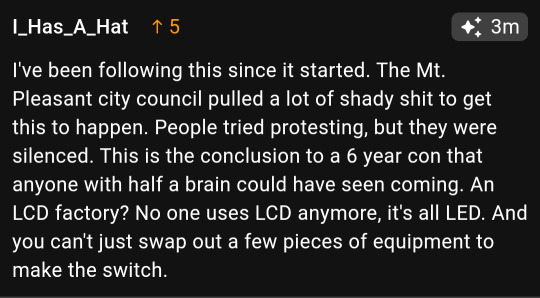#right to work
Text
"For the first time in almost 60 years, a state has formally overturned a so-called “right to work” law, clearing the way for workers to organize new union locals, collectively bargain, and make their voices heard at election time.
This week, Michigan finalized the process of eliminating a decade-old “right to work” law, which began with the shift in control of the state legislature from anti-union Republicans to pro-union Democrats following the 2022 election. “This moment has been decades in the making,” declared Michigan AFL-CIO President Ron Bieber. “By standing up and taking their power back, at the ballot box and in the workplace, workers have made it clear Michigan is and always will be the beating heart of the modern American labor movement.”
[Note: The article doesn't actually explain it, so anyway, "right to work" laws are powerful and deceptively named pieces of anti-union legislation. What right to work laws do is ban "union shops," or companies where every worker that benefits from a union is required to pay dues to the union. Right-to-work laws really undermine the leverage and especially the funding of unions, by letting non-union members receive most of the benefits of a union without helping sustain them. Sources: x, x, x, x]
In addition to formally scrapping the anti-labor law on Tuesday [February 13, 2024], Michigan also restored prevailing-wage protections for construction workers, expanded collective bargaining rights for public school employees, and restored organizing rights for graduate student research assistants at the state’s public colleges and universities. But even amid all of these wins for labor, it was the overturning of the “right to work” law that caught the attention of unions nationwide...
Now, the tide has begun to turn—beginning in a state with a rich labor history. And that’s got the attention of union activists and working-class people nationwide...
At a time when the labor movement is showing renewed vigor—and notching a string of high-profile victories, including last year’s successful strike by the United Auto Workers union against the Big Three carmakers, the historic UPS contract victory by the Teamsters, the SAG-AFTRA strike win in a struggle over abuses of AI technology in particular and the future of work in general, and the explosion of grassroots union organizing at workplaces across the country—the overturning of Michigan’s “right to work” law and the implementation of a sweeping pro-union agenda provides tangible evidence of how much has changed in recent years for workers and their unions...
By the mid-2010s, 27 states had “right to work” laws on the books.
But then, as a new generation of workers embraced “Fight for 15” organizing to raise wages, and campaigns to sign up workers at Starbucks and Amazon began to take off, the corporate-sponsored crusade to enact “right to work” measures stalled. New Hampshire’s legislature blocked a proposed “right to work” law in 2017 (and again in 2021), despite the fact that the measure was promoted by Republican Governor Chris Sununu. And in 2018, Missouri voters rejected a “right to work” referendum by a 67-33 margin.
Preventing anti-union legislation from being enacted and implemented is one thing, however. Actually overturning an existing law is something else altogether.
But that’s what happened in Michigan after 2022 voting saw the reelection of Governor Gretchen Whitmer, a labor ally, and—thanks to the overturning of gerrymandered legislative district maps that had favored the GOP—the election of Democratic majorities in the state House and state Senate. For the first time in four decades, the Democrats controlled all the major levers of power in Michigan, and they used them to implement a sweeping pro-labor agenda. That was a significant shift for Michigan, to be sure. But it was also an indication of what could be done in other states across the Great Lakes region, and nationwide.
“Michigan Democrats took full control of the state government for the first time in 40 years. They used that power to repeal the state’s ‘right to work’ law,” explained a delighted former US secretary of labor Robert Reich, who added, “This is why we have to show up for our state and local elections.”"
-via The Nation, February 16, 2024
#michigan#united states#us politics#labor#labor rights#labor unions#capitalism#unions#unionize#gretchen whitmer#democrats#voting matters#right to work#pro union#workers#workers rights#good news#hope
1K notes
·
View notes
Text
The unexpected upside of global monopoly capitalism

I'm touring my new, nationally bestselling novel The Bezzle! Catch me TODAY (Apr 10) at UCLA, then Chicago (Apr 17), Torino (Apr 21) Marin County (Apr 27), Winnipeg (May 2), Calgary (May 3), Vancouver (May 4), and beyond!

Here's a silver lining to global monopoly capitalism: it means we're all fighting the same enemy, who is using the same tactics everywhere. The same coordination tools that allow corporations to extend their tendrils to every corner of the Earth allows regulators and labor organizers to coordinate their resistance.
That's a lesson Mercedes is learning. In 2023, Germany's Supply Chain Act went into effect, which bans large corporations with a German presence from using child labor, violating health and safety standards, and (critically) interfering with union organizers:
https://www.bafa.de/EN/Supply_Chain_Act/Overview/overview_node.html
Across the ocean, in the USA, Mercedes has a preference for building its cars in the American South, the so-called "right to work" states where US labor law is routinely flouted and unions are thin on the ground. As The American Prospect's Harold Meyerson writes, the only non-union Mercedes factories in the world are in the US:
https://prospect.org/labor/2024-04-08-american-workers-german-law-uaw-unions/
But American workers – especially southern workers – are on an organizing tear, unionizing their workplaces at a rate not seen in generations. Their unprecedented success is down to their commitment, solidarity and shrewd tactics – all buoyed by a refreshingly pro-worker NLRB, who have workers' backs in ways also not seen since the Carter administration:
https://pluralistic.net/2023/09/14/prop-22-never-again/#norms-code-laws-markets
Workers at Mercedes' factory in Vance, Alabama are trying to join the UAW, and Mercedes is playing dirty, using the tried-and-true union-busting tactics that have held workplace democracy at bay for decades. The UAW has lodged a complaint with the NLRB, naturally:
https://www.commondreams.org/news/alabama-mercedes-benz
But the UAW has also filed a complaint with BAFA, the German regulator in charge of the Supply Chain Act, seeking penalties against Mercedes-Benz Group AG:
https://uaw.org/uaw-files-charges-in-germany-against-mercedes-benz-companys-anti-union-campaign-against-u-s-autoworkers-violates-new-german-law-on-global-supply-chain-practices/
That's a huge deal, because the German Supply Chain Act goes hard. If Mercedes is convicted of union-busting in Alabama, its German parent-company faces a fine of 2% of its global total revenue, and will no longer be eligible to sell products to the German government. Chomp.
Now, the German Supply Chain Act is new, and this is the first petition filed by a non-German union with BAFA, so it's not a slam dunk. But supermajorities of Mercedes workers at the Alabama factory have signed UAW cards, and the election is going to happen in May or June. And the UAW – under new leadership, thanks to a revolution that overthrew the corrupt old guard – has its sights set on all the auto-makers in the American south.
As Meyerson writes, the south is America's onshore offshore, a regulatory haven where corporations pay minimal or no tax and are free to abuse their workers, pollute, and corrupt local governments with a free hand (no wonder American industry is flocking to these states). Meyerson: "The economic impact of unionizing the South, in other words, could almost be placed in the same category as reshoring work that had gone to China."
The German Supply Chain Act was passed with the help of Germany's powerful labor unions, in an act of solidarity with workers employed by German companies all over the world. This is that unexpected benefit to globalism: the fact that Mercedes has extrusions into both the American and German political spheres means that both American and German workers can collaborate to bring it to heel.
The same is true for antitrust regulators. The multinational corporations that are in regulators' crosshairs in the US, the EU, the UK, Australia, Japan, South Korea and beyond use the same playbook in every country. That's doubly true of Big Tech companies, who literally run the same code – embodying the same illegal practices – on servers in every country.
The UK's Competition and Markets Authority has led the pack on convening summits where antitrust enforcers from all over the world gather to compare notes and collaborate on enforcement strategies:
https://www.eventbrite.co.uk/e/cma-data-technology-and-analytics-conference-2022-registration-308678625077
And the CMA's Digital Markets Unit – which boasts the the largest tech staff of any competition regulator in the world – produces detailed market studies that turn out to be roadmaps for other territories' enforces to follow – like this mobile market study:
https://assets.publishing.service.gov.uk/media/63f61bc0d3bf7f62e8c34a02/Mobile_Ecosystems_Final_Report_amended_2.pdf
Which was extensively referenced in the EU during the planning of the Digital Markets Act, and in the US Congress for similar legislation:
https://www.congress.gov/bill/117th-congress/senate-bill/2710
It also helped enforcers in Japan:
https://asia.nikkei.com/Business/Technology/Japan-to-crack-down-on-Apple-and-Google-app-store-monopolies
And South Korea:
https://www.reuters.com/technology/skorea-considers-505-mln-fine-against-google-apple-over-app-market-practices-2023-10-06/
Just as Mercedes workers in Germany and the USA share a common enemy, allowing for coordinated action that takes advantage of vulnerable flanks wherever they are found, anti-monopoly enforcers are sharing notes, evidence, and tactics to strike at multinationals that are bigger than most countries – but not when those countries combine.
This is an unexpected upside to global monopolies: when we all share a common enemy, we've got endless opportunities for coordinated offenses and devastating pincer maneuvers.

If you'd like an essay-formatted version of this post to read or share, here's a link to it on pluralistic.net, my surveillance-free, ad-free, tracker-free blog:
https://pluralistic.net/2024/04/10/an-injury-to-one/#is-an-injury-to-all
#pluralistic#monopoly#labor#nlrb#germany#harold meyerson#supply chain act#right to work#onshore offshore#uaw#vance alabama#vance#alabama#bafa#mercedes#antitrust#trustbusting
682 notes
·
View notes
Text

Michigan repeals 'right to work'. 👏🏻👏🏻👏🏻👏🏻
2K notes
·
View notes
Text
Like I gotta tell you the fact that humans experience sexual feelings might just not be the biggest problem in the world. I don't think some pubescent kid getting weird feelings about boobs is like personally oppressing women. Obv we need to teach people not to force their sexual wants and needs on others. But like. That's the same w not forcing things on others in general and teaching respect and self-regulation.
Sex work is work and deserves the same respect and regulation as any other work. You claim the porn industry is inherently misogynistic and that actors themselves are misogynists but have you ever considered that judging a woman's value by her sexual exclusivity and modesty is the most wildly misogynistic shit? Have you ever considered, dear fake feminists, that YOU are the misogynists whose "activism" only applies to the women YOU think deserve equality and freedom and rights. If your feminism doesn't have room for sex workers or trans women or women of color it is not feminism; it's just misogyny. You don't want equality, you want a matriarchy where only Acceptable Cis White Modest Christian Women are on top. So basically the exact model of the patriarchy but with Specific women instead.
#feminism#terfs and swerfs dni#anti swerf#sex work is work#respect sex workers of all genders#modesty is not value#purity culture#what kind of politics you gotta have that the thing youre most outspoken about is how sex is evil#the audacity to assume how peoples kinks and fetishes work also#if i wanna fuck robots r u gonna tell me thats some weird misogyny metaphor too? get outta here#misoginy#women are not required to be 'modest and pure' to deserve respect#right to work#yall just invented patriarchy part 2 and think thats feminist
32 notes
·
View notes
Video
Michigan Lawmakers Vote To Repeal State’s ‘Right To Work’ Law
https://www.huffpost.com/entry/michigan-right-to-work-repeal_n_6410eb1ee4b00c3e6070aa1b
The Racist Roots of right to work
https://www.afscme.org/blog/the-racist-roots-of-right-to-work
https://aflcio.org/
#tiktok#union workers#labor unions#trade union#unions#labor history#labor movement#labor vs capital#capital vs labor#labor rights#class solidarity#article#right to work#labor movements#workers rights#workers vs capital#essential workers#workers#health insurance#history
62 notes
·
View notes
Text
NEW: There is no such thing as an illegal strike (or union!), only an unsuccessful one.
Don't let bogus "right to work" laws get in your way:
41 notes
·
View notes
Text
Sen. Elizabeth Warren (D) plans to reintroduce a bill on Thursday that would ban anti-union “right-to-work” laws that are now on the books in a majority of states.
Such laws forbid employers and unions from entering into agreements stipulating that every worker covered by the contract pay fees to the union. In doing so, they allow workers to opt out of paying any dues while still enjoying the benefits of a union contract and representation.
Warren and other Democrats have railed against the provisions for years, but that hasn’t stopped the laws from proliferating in Republican-led states hostile to organized labor. Twenty-seven states have now put right-to-work laws in place, with Kentucky being the most recent in 2017.
Warren said in a statement to HuffPost that Democrats were making clear they “stand in solidarity with workers everywhere.”
“Republicans and their corporate interest backers have imposed state laws with only one goal: destroy unions and discourage workers from organizing for higher wages, fair benefits, and safer working conditions,” she said.
The Massachusetts senator has rounded up 18 co-sponsors in her chamber ― all Democrats, plus the independent Sen. Bernie Sanders (Vt.) ― for what she’s calling the Nationwide Right to Unionize Act. She previously introduced similar versions of the bill in 2017 and 2020.
Rep. Brad Sherman (D-Calif.) has introduced a companion bill on the House side, where a dozen Democrats have co-sponsored it so far.
Despite Democrats currently holding threadbare majorities in the House and Senate, the odds of the legislation making it to President Joe Biden’s desk are slim to zero in the current Congress.
Even if Senate Democrats were willing to dispense with the filibuster that requires 60 votes to surmount, they could still struggle to get centrist colleagues in their caucus onboard with the plan. Two of those colleagues — Democratic Sens. Kyrsten Sinema and Mark Kelly — hail from the right-to-work state of Arizona and have a history of frustrating their party’s progressive wing.
Nonetheless, the right-to-work bill and other aggressive labor proposals like it can help unions gauge where Democrats stand on their priorities.
Unions have been fighting right-to-work measures on multiple fronts in recent years. In addition to the state laws that have been passed, the conservative majority of the Supreme Court ruled in 2018 that government workers could not be required to pay what are known as “fair share” fees to cover the cost of union representation. The decision, Janus v. AFSCME, effectively made the entire U.S. public sector right-to-work.
Missouri nearly became the latest state to implement such a law, but after the GOP-led state legislature passed one in 2017, voters promptly overturned it the following year by referendum.
Democrats have included a ban on right-to-work laws in their massive proposal to overhaul labor law known as the Protecting the Right to Organize Act. The bill would also significantly ramp up penalties against employers for illegal union-busting and make it easier for workers to secure a first collective bargaining agreement, among other significant legal changes.
Like Warren’s standalone proposal to unwind the right-to-work regime, the PRO Act faces an obstacle in the Senate filibuster. Progressives had hoped to include some measures of the PRO Act in their big party-line package that was passed in August, but none made it into the final law.
Biden, who has fashioned himself the “most pro-union President” in history, has endorsed the PRO Act as well as the repeal of right-to-work laws.
“We should change the federal law [so] that there is no right-to-work allowed anywhere in the country,” Biden told a Teamsters conference in 2020. “For real. Not a joke.”
#us politics#news#union workers#unionize#working class#workers#worker's rights#2022#huffington post#sen. elizabeth warren#right to work#Nationwide Right to Unionize Act#sen. bernie sanders#Rep. Brad Sherman#sen. kyrsten sinema#sen. mark kelly#Janus v. AFSCME#us supreme court#scouts#Protecting the Right to Organize Act#pro act#president joe biden#biden administration
24 notes
·
View notes
Text



#foxconn#wisconsin#right to work#chinese company in the us#colonizers#essential communities destroyed#apple#evil#america#right wing#capitalism#usa#republicans
2 notes
·
View notes
Quote
As per the Act, the workers should get work as demanded, said activist Nikhil Dey. “Rural workers registered under the scheme are mandated to get work under Article 21 of the Constitution. The Article recognises the right to work as a fundamental right, which is being violated daily. These workers have the right to seek work for 100 days and earn a dignified income,” said Dey. The law also enables these workers to seek unemployment allowance and compensation for delayed wages for each passing day without work. “The central government is not following the rules, which is creating a crisis across the state and the country,” he added.
Himanshu Nitnaware, ‘Surviving on fish from gutter, rice: West Bengal workers bear brunt of Central freeze on MGNREGA funds’, Down To Earth
#Down To Earth#Himanshu Nitnaware#India#MGNREGA#Indian Constitution#Nikhil Dey#Rural workers#right to work#unemployment allowance#compensation for delayed wages#Government of India#West Bengal
3 notes
·
View notes
Text
Not socialist in a “I won’t have to work” type of way but socialist in a “I’ll still be working but I won’t be worried I won’t make the rent” type of way. In a “billions won’t be hoarded by one person” type of way. In a “janitors, fast-food workers, child care workers, preschool teachers, hotel clerks, personal care and home health aides, and grocery store cashiers, will live comfortably” type of way. In a “the sick and elderly will be cared for” type of way. In a “no child should work” type of way.
#socialist#socialism#communism#anti capitalism#the belief that we won’t work under capitalism genuinely makes me so mad#like#you realize the goal of social reform is to abolish imperialism right?#there won’t be good just showing up out of nowhere without slavery and/or imperialism
86K notes
·
View notes
Text

Source

Source
54K notes
·
View notes
Text
My one basic opinion is that nobody should ever have to live in poverty and boy oh boy does this make some motherfuckers real mad!
#aporophobia#eat the rich#feed the poor#steal from the rich#give to the poor#social justice#human rights#democratic socialism#support the working class
43K notes
·
View notes
Text
instagram
0 notes
Text



A h-heartfelt reunion..?
Bonus

#Sir Crocodile#Monkey D Dragon#Emporio Ivankov#Dragodile#Crocodad#My art#One Piece#We're not gonna talk about the work I should be doing rn I have Severe Procrastinitis and I'm doing my best okay#Alternative version where it was both Crocodile and Garp beating Dragon's ass before Iva-chan joined in but that was too much effort lmao#I'm a believer in Dragon being a Wind Logia so don't worry guys he is 100% taking this beating intentionally#He knows what he did and he's dealing with the concequences of his actions. With grace.#You know I realize Iva-chan should be two whole meters taller than Crocodile but we're just gonna ignore that#Look Iva-chan taking Crocodile's side and being like ''Crocoboy is right you fucked up bad Dragon'' brings me joy#And for real I've been wanting to draw this for months. But never did because I had other shit to do. Which I still do#But. You know. Sometimes you need to draw a shitpost. It's ✨ self-care ✨#And appearently One Piece shitpost comics have become the thing I draw for myself on occassion
11K notes
·
View notes
Video
History of Right to Work Laws
#tiktok#right to work#labor vs capital#capital vs labor#labor rights#labor movement#labor#labor movements#union workers#labor unions#trade unions#unions#american racism#collective action#union organizing#union history#labor history#history#workers rights#wages and salaries#wages
21 notes
·
View notes